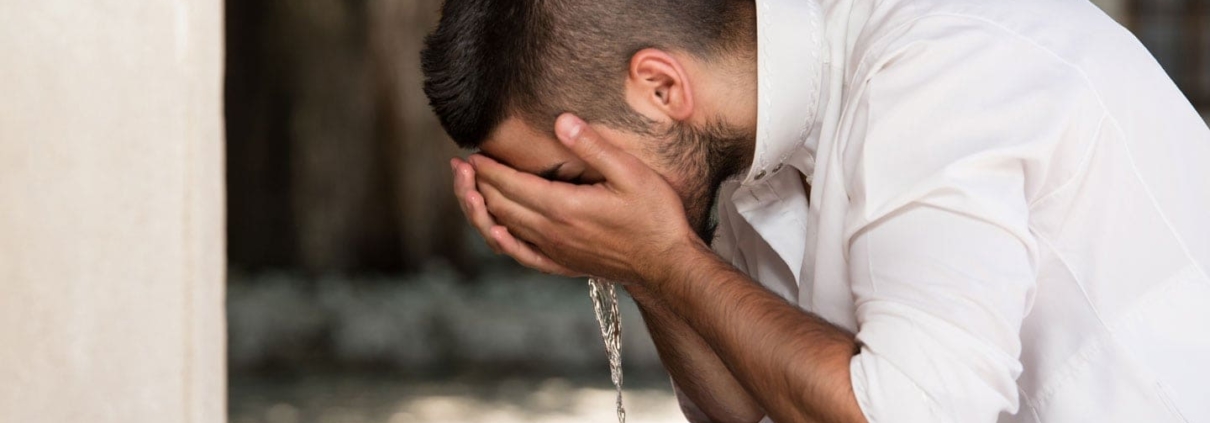In Need of Advices for Ritual Purity.
Hanafi Fiqh
Answered by Shaykh Abdul-Rahim Reasat
Question: Assalamu alaykum
My condition is that I have an urge to frequently urinate.
I have seen that from 2 incidents that when I have actually gone to the bathroom I can see some substance thing at the tip.
The issue is that I cannot tell when this happens this I don’t know when my wudu is broken.
Would I be required to go to the bathroom prior to every prayer and check to see if anything has dried up?
I am looking to study the deen at a later point in my life. Could you please give me some advise and also are there examples of scholars of the past who have pursued the deen full time regardless of their illnesses?
Answer: Wa ‘alaykum as-salam wa rahmatullah wa barakatuh
I pray you are well.
Don’t Obsess
Let’s keep things simple. If you see something has come out and dried then you can assume it did so at the most recent moment possible. In other words, if you made wudu and prayed, and then half an hour later you went to the bathroom only to find a dried substance, you can assume it happened within the last few minutes. The amount of time it was take to exit an dry – so within 5 or 10 minutes.
Beyond that, you do not need to have a routine of checking. Make wudu and pray. If you need to renew it or go to the bathroom, do so. If you are certain something has exited renew your wudu.
Getting Help
In all likeliness the discharge you see is wadi (prostatic fluid). This discharge usually exits before or after urination, but can exit when pressure is exerted on the prostate when sitting, etc, if the prostate is enlarged. This symptom and the need to urinate are commonly found together. Sometimes the cause of these issues is psychosomatic, so therapies like EFT can help.
Try to find a good practitioner of Tradition Chinese Medicine, as TCM can easily remedy you symptoms.
Don’t worry about ‘opening the hole’ and checking. This might open up a can of worms which will only complicate matters.
Studying and Trials
Your intention to go and study the region is commendable, and a huge blessing from Allah. Make your intention for Him alone, and find a reliable scholar and consult with him every step of the way.
As for trials – whether they take the form of illness, finances, or otherwise – they come no matter what. You can think of them as an occupational hazard. They are the means by which Allah helps a person grow.
Everyone is tested. In fact, there are many instances of the ulema serving the umma selflessly through teaching, writing, or otherwise, whilst mountains of trials are crumbling upon them. What is amazing is that Allah give them the ability to persist and keep serving the Muslims despite what they endure.
Shaykh Abdul Fattah Abu Ghudda wrote a whole book (Safahat Min Sabr al Ulamaʾ – Pages from the Patience of the Scholars) on the matter.
Make your intention for Allah and follow through. Know that what hits you was never going to miss, and what misses you was never going to hit. If Allah tests you He will also give you the ability to get through the tests too.
May Allah grant you the best of both worlds.
Wassalam,
[Shaykh] Abdul-Rahim Reasat
Shaykh Abdul-Rahim Reasat began his studies in Arabic Grammar and Morphology in 2005. After graduating with a degree in English and History he moved to Damascus in 2007 to study and sit at the feet of some of the most erudite scholars of our time.
Over the following eighteen months he studied a traditional curriculum, studying with scholars such as Shaykh Adnan Darwish, Shaykh Abdurrahman Arjan, Shaykh Hussain Darwish and Shaykh Muhammad Darwish.
In late 2008 he moved to Amman, Jordan, where he continued his studies for the next six years, in Fiqh, Usul al-Fiqh, Theology, Hadith Methodology and Commentary, Shama’il, and Logic with teachers such as Dr Ashraf Muneeb, Dr Salah Abu’l-Hajj, Dr Hamza al-Bakri, Shaykh Ahmad Hasanat, Dr Mansur Abu Zina amongst others. He was also given two licences of mastery in the science of Qur’anic recital by Shakh Samir Jabr and Shaykh Yahya Qandil.
His true passion, however, arose in the presence of Shaykh Ali Hani, considered by many to be one of the foremost tafsir scholars of our time who provided him with the keys to the vast knowledge of the Quran. With Shaykh Ali, he was able to study an extensive curriculum of Qur’anic Sciences, Tafsir, Arabic Grammar, and Rhetoric.
When he finally left Jordan for the UK in 2014, Shaykh Ali gave him his distinct blessing and still recommends students in the UK to seek out Shaykh Abdul-Rahim for Quranic studies. Since his return he has trained as a therapist and has helped a number of people overcome emotional and psychosomatic issues. He is a keen promoter of emotional and mental health.
